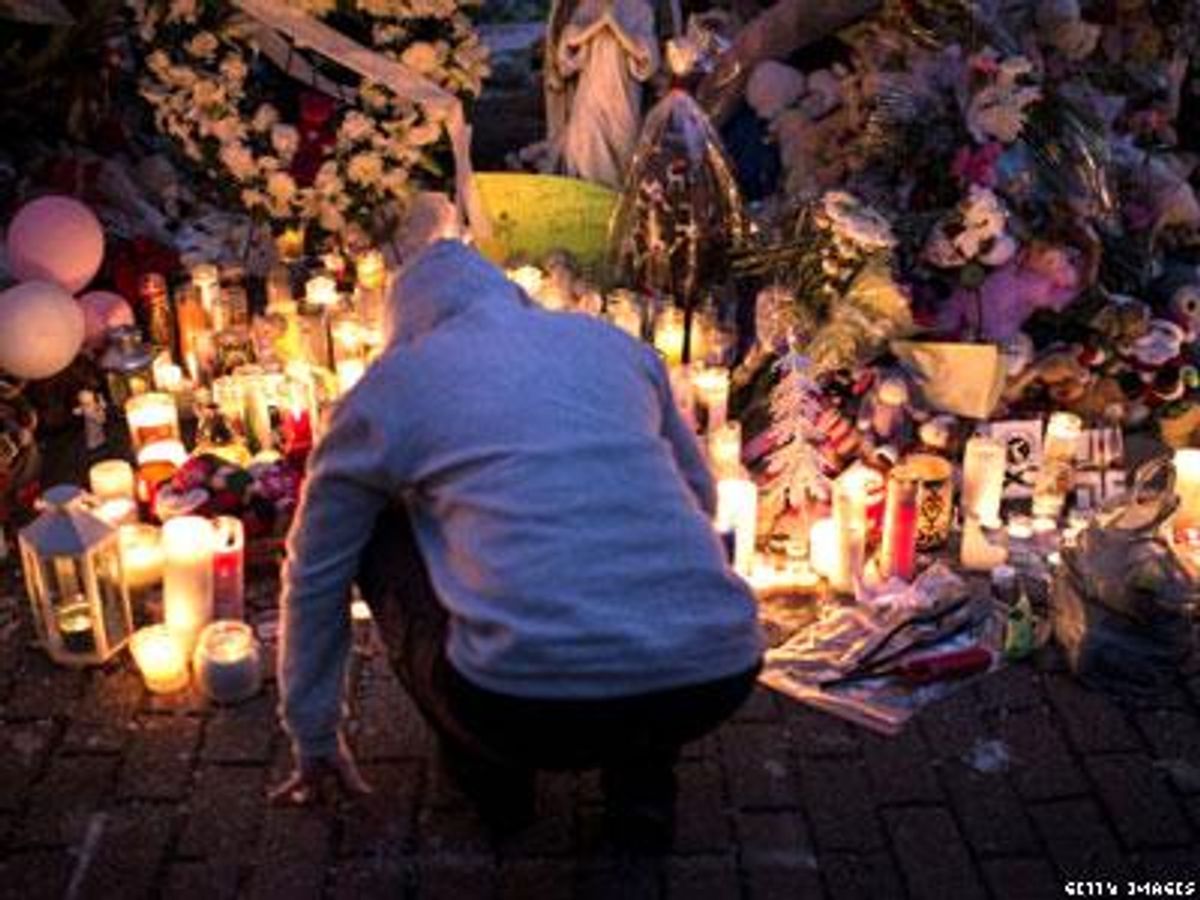All Rights reserved
By continuing to use our site, you agree to our Private Policy and Terms of Use.
I think it's safe to say that we were all stunned and saddened at the news of last week's elementary school shooting in Connecticut. Sure, today's modern-day news consumer is pretty calloused to the usual stories of death and disaster that grace our papers and computer screens every morning. There are tsunamis in Asia, wars and conflicts in the Mid-east, and financial doomsday prophecies taking place here on our home turf. But every so often, one story emerges from the chaos as something that causes even the most desensitized person to stop for a minute and marvel at humankind's capacity for cruelty and malice, as well as courage and empathy and generosity. Of course, shortly after this minute ends, both liberal and conservative pundits take to their soapboxes and megaphones on TV and the web claiming to have the answer. We all know these speeches, since we've heard them time and again since Columbine in 1999.
What angers me is not necessarily that parties and pundits will exploit tragedy to further their agendas. Instead, I'm appalled that, no matter how many times this debate occurs, no one ever seems to evolve on this issue. Liberals argue for more regulation. Conservatives argue for less. Largely, we go about our daily business and pretend to be shocked when the cycle repeats itself once again. As much as we like to think that we learn from our mistakes, posterity begs to differ.
But why have we often put so much emphasis on the instrument while practically ignoring the individual?
Like a lot of people, I very enthusiastically support stricter gun control. While I do buy into the mantra of "guns don't kill people, people kill people," I do only to a certain extent. After all, when was the last time you heard of someone going on a "strangling spree" in the middle of a mall or a school and killing 20 or so people in one fell swoop? But incidents like Newtown, Aurora, and even Columbine are only symptoms of what I believe to be a greater issue. Thus, using gun control laws as a potent response would be like trying to treat cancer with painkillers. Sure, it may make us feel better, but it does little to address the true problem.
There's a lot of talk in this country about physical health -- health care, obesity, the effects of certain foods and diets on our body -- and yet no one seems to be addressing mental health. What good is a physically fit person if he or she is psychologically unwell? Especially when that person is capable of buying a gun and taking out their anguish on the innocent? Why is it easier to buy a gun than to seek psychological help?
Most people know their doctors on a first-name basis. But would you know where to call in the event of a mental health crisis? What do you know about your own insurance? Do you know what mental health benefits it offers, if any? I'm not just talking about treating potential problems, either. You're supposed to get a physical from your doctor once a year, even when you're healthy. We should add mental health check-ups to the list.
I feel like the LGBT community should especially rally in support of this cause, because it also helps combat another issue that continues to devastate our community: teen suicide. While bullying and homophobia were the primary discussion surrounding deaths like those of Tyler Clementi, Asher Brown, Jamie Rodemeyer, and so on, there was too little speculation as to how mental health counseling could have helped save these young lives. As much as we like to think that we can effectively eradicate bullying and homophobia in our schools, eliminating them completely is virtually impossible. So what else can we do to fix this issue? In order to attend public school, I had to undergo regular health screenings and have vaccines that were current and up-to-date. Yet, students typically only talk to counselors when there's a problem. Even then, these are usually guidance counselors, not necessarily mental health professionals.
In my entire childhood, I was only brought to a professional once, and that was to get tested for the "gifted program." Meanwhile, I should have been getting help after being sexually assaulted in third grade. Unfortunately, my problem, much like the problems of Tyler, and Jamie, and Asher, went unnoticed. Thankfully, a group of peer counselors at my old church managed to help me out before I had the chance to do something drastic to myself. But even then, this happened only many years after my incident, thus making much of my psychological damage permanent.
So I hope that, this time around, we can use the recent tragedy in Connecticut -- as well as the unfortunately countless tragedies that have happened before -- as an opportunity to discuss and address the issue of preventative mental health care. Yes, it's true that a weapon is harmless by itself. But instead of regurgitating tired slogans like "guns don't kill people; people kill people," let's recognize that guns aren't the problem -- people are the problem. We won't have to worry about anyone using a weapon to harm others or even themselves if we ensure the mental and emotional well-being of our citizens.
R.J. AGUIAR is one half of the blogger couple behind NotAdamAndSteve.com. He and his partner also run a daily YouTube vlog at youtube.com/shep689.













































































